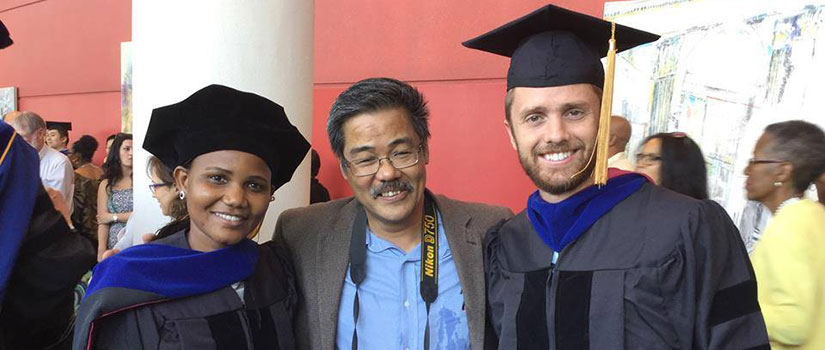September 14, 2016 | Erin Bluvas, bluvase@sc.edu
As a freshman at the University of Nairobi, Caroline Mulatya was excited to pursue a career in banking and finance. While in her third year at the University, Caroline got an internship at the Division of Malaria Control (DMC) within Kenya’s Ministry of Health. Her experience as an intern at DMC would later influence a complete change in her career path.
“I got a grasp of the high malaria cases and mortality rates especially among children in Kenya,” she says. “By then there were so much data on malaria cases across years, but the reporting was mainly based on descriptive statistics and graphs.”
According to Mulatya, the gaps in the data analysis were partly due to a lack of trained biostatisticians and expertise in advanced statistical modeling that could be used to study the association of malaria cases and risk factors over the years or evaluate the effectiveness of intervention measures. After she graduated with a Bachelor of Science in Statistics, Mulatya worked on a multi-center clinical trial on the Prevention of Mother-to-Child Transmission of HIV during breast feeding.
I knew I needed to play my part in reviving the Kenyan public health sector and contribute towards making the world a better place to live.
-Caroline Mulatya, Ph.D. in Biostatistics
“Kenya has made tremendous gains in preventing perinatal transmission of HIV, but we still have new incidences especially in rural areas coupled with social stigma,” she says. “These encounters encouraged me to pursue a career in public health. I knew I needed to play my part in reviving the Kenyan public health sector and contribute towards making the world a better place to live.”
After receiving a scholarship from the Flemish Interuniversity Council, Mulatya moved to Belgium to earn dual master’s degrees (Applied Statistics; Biostatistics) from the Universiteit Hasselt. She spent a year as a pre-doctoral student in the Human and Clinical Genetics Department at Leiden University Medical Center in the Netherlands before enrolling in the Arnold School’s Ph.D. in Biostatistics program.
While applying to graduate schools, Mulatya almost missed USC’s Arnold School of Public Health but was grateful to discover it during a return trip to the SOPHAS website. She chose her doctoral program due to the low faculty-to-student ratio in her department, knowing that she would get more opportunities to interact with professors compared to other programs.
I would encourage students to interact and consult widely with professors and identify projects that align well with their career goals.
-Caroline Mulatya, Ph.D. in Biostatistics
Her opportunities for mentorship did not disappoint, particularly when it came to collaborations with her academic advisor and dissertation chair, Assistant Professor Alexander McLain. [Mulatya is pictured above at the 2016 Arnold School Hooding Ceremony with McLain (right) and Statistics Professor Edsel Peña (center).]
“Choosing Dr. McLain to be my mentor was the best decision for my biostatistics career,” Mulatya says. “He appreciated my research experiences and gave me mentorship in both theoretical and application aspects that shaped me into a well-rounded biostatistician. Dr. McLain wants the best for his students and is passionate about their success; he is also friendly and always available to advise his students.”
Mulatya’s primary interests are in developing and implementing clinical trials, longitudinal data analysis, survival data analysis and spatial data analysis. She has collaborated and analyzed a range of public health data sets, including maternal and child outcomes, infectious diseases, diabetes, cancer, macro-array, and traumatic brain injury data. These experiences have resulted in seven manuscripts, with one published in Statistics in Medicine and the other six in various stages of revision and preparation.
There are so many clinical trials with sites in East Africa and Africa as a whole that are managed by clinical research organizations here in the U.S.
-Caroline Mulatya, Ph.D. in Biostatistics
The Norman J. Arnold Fellow graduated in May of this year and began the next phase of her biostatistics career with a full-time position at Emmes. The company was named one of the 2016 Top Places to Work by the Washington Post.
In her role as a Biostatistician for Emmes, Mulatya provides statistical expertise across all stages of the clinical trial life cycle, including study design, protocol development, data analysis and manuscript publication. “I would encourage students to interact and consult widely with professors and identify projects that align well with their career goals,” says Mulatya of the lessons she learned during her time at the Arnold School. “It is important for students to chart their own career path and not take up projects for convenience. I would also encourage biostatistics students to invest in both applied and theoretical aspects to become well-rounded biostatisticians who then have the flexibility to engage in a range of career options.”
Taking advantage of her doctoral program, working with a global research organization—it’s all a part of Mulatya’s plan to make the world a healthier place and make an impact in her homeland. “There are so many clinical trials with sites in East Africa and Africa as a whole that are managed by clinical research organizations here in the U.S.,” she says of her ability to contribute to her country’s health even from across the world.
